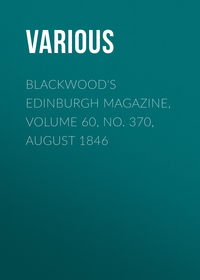
Blackwood's Edinburgh Magazine, Volume 60, No. 370, August 1846
Meanwhile, a change of a different kind seemed to be coming over Ormiston. It was remarked, even by those not much given to observation, that his lectures, which were once considered endurable, even by idle men, from his happy talent of remark and illustration, were fast becoming as dull and uninteresting as the common run of all such business. Moreover, he had been in the habit of giving, occasionally, capital dinners, invitations to which were sent out frequently and widely among the young men of his own college: these ceased almost entirely; or, when they occurred, had but the shadow of their former joyousness. Even some of the fellows were known to have remarked that Ormiston was much altered lately; some said he was engaged to be married, a misfortune which would account for any imaginable eccentricities; but one of the best of the college livings falling vacant about the time, and, on its refusal by the two senior fellows, coming within Ormiston's acceptance, and being passed by him, tended very much to do away with any suspicion of that kind.
Конец ознакомительного фрагмента.
Текст предоставлен ООО «ЛитРес».
Прочитайте эту книгу целиком, купив полную легальную версию на ЛитРес.
Безопасно оплатить книгу можно банковской картой Visa, MasterCard, Maestro, со счета мобильного телефона, с платежного терминала, в салоне МТС или Связной, через PayPal, WebMoney, Яндекс.Деньги, QIWI Кошелек, бонусными картами или другим удобным Вам способом.
1
Notes and Recollections of a Professional Life. By the late Wm. Fergusson, M.D., Inspector-General of Military Hospitals. Longmans: 1846.
The Military Miscellany. By Henry Marshall, F.R.S.E., Deputy Inspector-General of Army Hospitals. Murray: 1846.
2
Sir Charles Napier.
3
"The author, soon after his last return from the West Indies, at the close of the year 1817, was induced, from the then troubled state of the country, to join the ranks of a volunteer corps in Scotland, which was drilled and instructed by experienced men in all manner of ways, with the exception of the one thing needful – the firing ball – for during the whole time he remained with them, nearly two years, that was never thought of; and this was the case generally with the whole volunteer force of Great Britain, as well as the militia, at least in the early part of the war. Future wars must and will recur, and volunteer corps will again be formed; but if they be unused to the full-charged musket, however much their first appearance may impose, they will be found, when brought into action, of as much use as so many Chinese. Let them not suppose that until they have attained this skill, which it is in the power of every man to do, they are qualified to fight the battles of their country. * * * * In their present state, supposing two such bodies to get into collision, it would indeed be matter of wonder to think how they could contrive to kill one another without the aid of the cannon and other adjuncts. If they carried broomsticks on their shoulders, instead of muskets, they would no doubt make a sturdy fight of it; but with fire-arms which they had never been taught to use, the battle would resemble those of the Italian republics in the middle ages, when mailed knights fought the livelong day without mortal casualty." – Dr Fergusson, p. 42.
Is ball practice sufficiently attended to in our army generally? We are inclined to doubt it. "We are economical people," says Dr Ferguson in another place, "famed for straining at gnats and swallowing camels, and the expense of ball cartridge is ever brought up in bar of the soldier being in the constant habit of firing it." We should also like to see some of our muskets replaced by rifles, an arm in which we have ever been deficient.
Вы ознакомились с фрагментом книги.
Для бесплатного чтения открыта только часть текста.
Приобретайте полный текст книги у нашего партнера:
Полная версия книги
